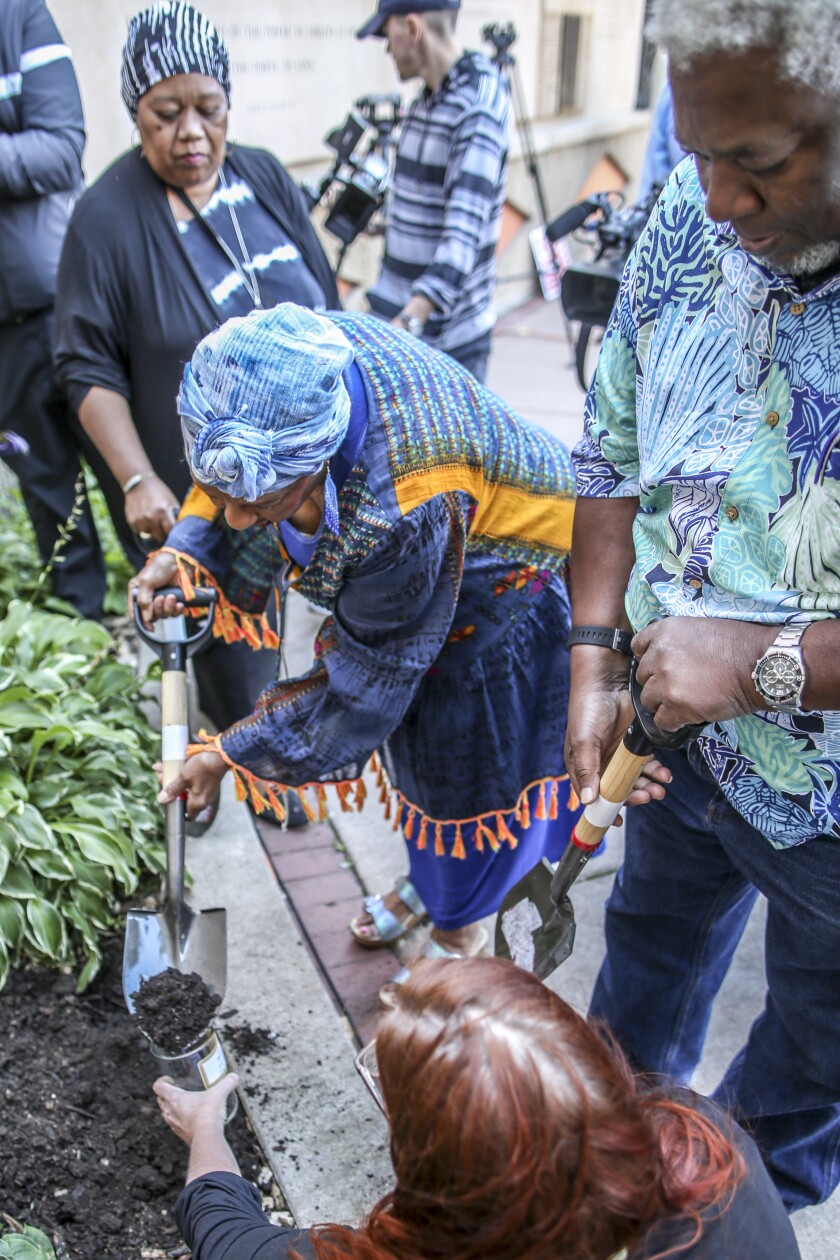Soil from the Clayton Jackson McGhie memorial in downtown Duluth was gathered Sunday to become part of the first-ever national lynchings memorial planned for Montgomery, Ala.
Community leaders gathered at the Duluth site with officials from the Montgomery-based nonprofit Equal Justice Initiative to honor the three local victims and pledge their alliance with the national effort.
About 100 people watched as elders from Duluth's black community shoveled soil into three jars - one for each of the Duluth victims - as an Anishinaabe honor song was sung.
The Duluth memorial, built in 2003, commemorates the June 15, 1920, lynchings of circus workers Elias Clayton, Elmer Jackson and Isaac McGhie. The three black men, suspects in an assault against a white girl, were taken from the jail, beaten and hanged on a light post by a mob of thousands of whites in downtown Duluth. Officials later said there was no evidence the assault the men were blamed for actually took place.
They were the only documented lynchings of blacks in Minnesota history, but were among thousands nationwide.
ADVERTISEMENT
A 2015 report by the Equal Justice Initiative documented more than 4,000 black people lynched across the U.S., most in the deep South, between 1877 and 1950. Subsequent research has raised that number to nearly 5,000 black men, women and children, who were hanged, burned alive, shot, drowned and beaten to death by white mobs.
Heidi Bakk-Hansen, secretary of the Clayton Jackson McGhie Memorial board of directors, said the lynching murders of black people was a national epidemic that for decades was ignored and which is still is marginalized.
"It's a piece of history that our country still doesn't address very well, except for maybe a paragraph in high school history books," she said.
"There have been efforts for years to a do a national memorial, but all of them just sort of faded away for whatever reasons," Bakk-Hansen told the News Tribune. "But, this time, the Equal Justice Initiative seems to be really doing it."

The 11,000-square-foot Memorial to Peace and Justice is set to open in 2018. It is the first national memorial to lynchings and will stand in stark contrast to the "hundreds of memorials to the defenders of slavery, and leaders who championed racial segregation and white supremacy, including many who perpetrated violent crimes against black citizens during the era of racial terror. In Montgomery alone there are 59 monuments and memorials to the Confederacy," the initiative notes.
Stephan Witherspoon, president of the Duluth chapter of the NAACP, said it's right to honor those who died "for no reason." He said he plans to attend the opening event for the new national memorial.
ADVERTISEMENT
"It's a dark side of the history of America that has to be brought to light," Witherspoon said. "The fact we still have to fight this battle for racial justice, even today, is frustrating. ... But we are going to fight. We are going to remember. We are going to honor these people who were and still are being killed."
Soil from at least 400 lynching sites will be on display at the new facility which is expected to feature 800 columns, one for each U.S. county where a lynching has been confirmed.
"We want to create an institution that allows people to experience directly what this history means and what it does," said Bryan Stevenson, the initiative's executive director, in announcing the facility. "In America, we don't talk about slavery. We don't talk about lynching. We don't talk about segregation. Our silence has left us vulnerable to new forms of bigotry and discrimination that we need to address."
Bakk-Hansen said the timing of the new memorial couldn't be better, just as white supremacist groups appear emboldened to become more public under the Trump presidency.
"The threat, especially to young black men, isn't over," Bakk-Hansen said. "We have mobs of white men carrying torches in public again. We haven't come that far, really."
The Equal Justice Initiative provides legal assistance to condemned prisoners, people wrongly convicted or unfairly sentenced, children in the criminal justice system, and the mentally ill and disabled facing imprisonment. In 2008, the initiative launched a racial-history project that aims to recast the eras of slavery, racial terror and Jim Crow segregation as the precursors to today's discriminatory criminal justice system that they say disproportionately targets black men.
People need to follow the link between the lynchings of the past to today's issues, because "we can't understand the challenges we face today without understanding that history," said Kiara Boone, deputy program manager of the Equal Justice Initiative who was in Duluth to bring the soil to Alabama.
The institute also is building a museum about one mile for the memorial to display historical items documenting the black plight in the U.S. "from slavery to (today's current) mass incarceration."
ADVERTISEMENT
Free event at UMD today
Leaders from the Equal Justice Initiative will lead a panel discussion today at noon at the University of Minnesota Duluth Kathryn A. Martin Library rotunda. "Lynching in America: Documenting and Memorializing the Era of Racial Terror" is free and open to the public.











